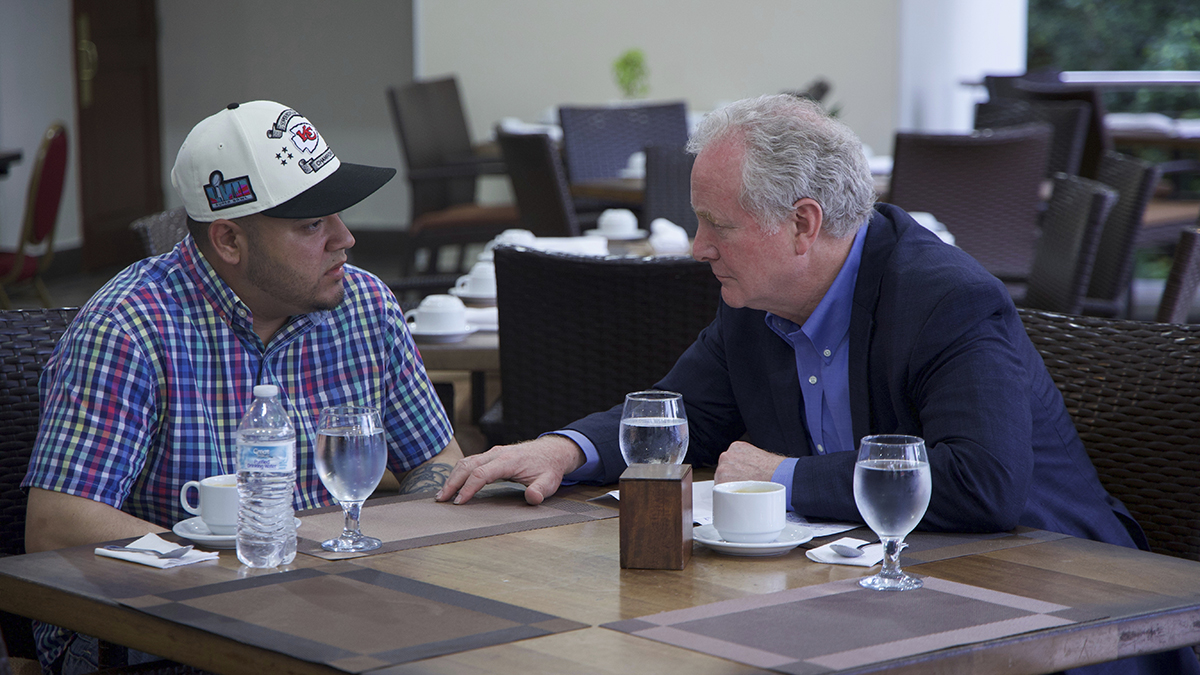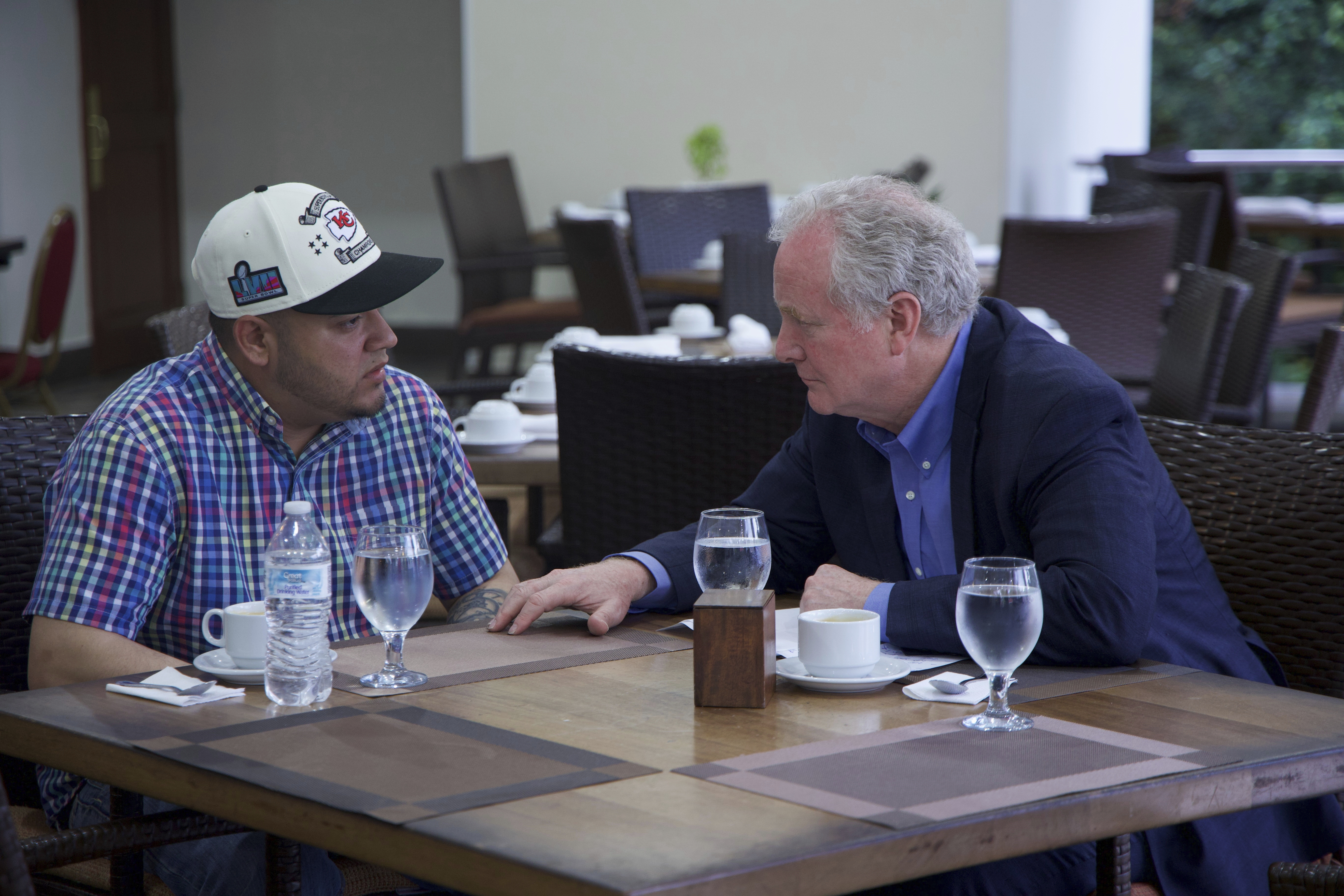El Salvador Trip: Senator's Fight for Deported Man
Maryland Senator's El Salvador Trip: Justice Denied?
Introduction: A Senator's Mission
Imagine being wrongly deported from your home, separated from your family, and thrust into a foreign land you barely know. That's the reality Kilmar Abrego Garcia faces. Maryland Senator Chris Van Hollen recently returned from El Salvador after a meeting with Abrego Garcia, a man whose deportation has sparked outrage and ignited a political firestorm. But what did the Senator accomplish, and what's next for Abrego Garcia? Let’s dive in and explore this complex situation.
The Abrego Garcia Case: A Summary
Mistaken Identity, Tragic Consequences
Kilmar Abrego Garcia's story is a stark reminder of how immigration policies can impact individual lives. Deported under the Trump administration, Abrego Garcia's case is unique. Even Republican officials acknowledged his deportation as a mistake. The US Supreme Court even called on the administration to facilitate his return. Despite this, he remains in El Salvador. It's a case that begs the question: How can such a clear error remain uncorrected?
Senator Van Hollen's Involvement: A Beacon of Hope?
A Congressional Visit
Senator Van Hollen's trip to El Salvador signifies a continued effort by some US politicians to rectify this situation. Visiting Abrego Garcia in person sends a powerful message. It demonstrates concern and determination to seek justice for someone caught in the system. What did he learn during his visit? What strategies will he employ to advocate for Abrego Garcia’s return? These are the questions on everyone’s mind.
Political Obstacles: A Tangled Web
Trump, Bukele, and the Stalemate
The political landscape surrounding this case is far from simple. President Trump and El Salvador's President Nayib Bukele have seemingly "dug in their heels," resisting calls for Abrego Garcia's return. It’s as if they're playing a game of political chess. But with real-life consequences. This unwavering stance, despite evidence of wrongful deportation, raises serious concerns about the principles of fairness and justice.
Nayib Bukele's Response: Defiance and Mockery?
Tweeting from the Terrorism Confinement Center
President Bukele's response has been particularly unsettling. He posted images of Senator Van Hollen’s meeting with Abrego Garcia, boasting that Abrego Garcia would "get the honor of staying in El Salvador's custody." This blatant disregard for human rights and due process is deeply concerning. Is this a political power play, or something more sinister?
The CECOT: A Symbol of Repression
Inside El Salvador's Notorious Prison
Bukele's reference to the "Terrorism Confinement Center, or CECOT," is chilling. This prison is notorious for its harsh conditions and alleged human rights abuses. Forcing Abrego Garcia to remain in the CECOT feels like an act of spite. It’s a direct snub to those advocating for his release. Is it being used as a political prop?
The White House's Stance: Unwavering Opposition
"He Will Never Live in the..."
White House press secretary Karoline Leavitt's statement that Abrego Garcia will "never live in the Uni..." (presumably, the United States) is a harsh and definitive declaration. This uncompromising position suggests a lack of willingness to reconsider the case. Does it truly reflect the values of justice and fairness?
Democratic Pressure: A Rising Tide?
More Democrats Head to El Salvador
Despite the challenges, other Democrats have expressed their intention to travel to El Salvador to advocate for Abrego Garcia's release. This surge in support suggests a growing movement. It aims to increase pressure on both the US and El Salvadorian governments. Will this increased attention make a difference? Or will it be met with continued resistance?
The Supreme Court's Involvement: A Legal Mandate?
Calling for Facilitation of Return
The US Supreme Court's involvement is a significant aspect of this case. Their call for the administration to facilitate Abrego Garcia's return carries considerable weight. It suggests a legal obligation to correct the injustice. The administration's failure to comply with this request raises questions about the rule of law.
What's Next? Potential Outcomes
Legal Battles, Diplomatic Efforts, and Public Opinion
So, what are the possible outcomes? Abrego Garcia could continue to pursue legal avenues, hoping to overturn the deportation order. Diplomatic efforts might continue, with US officials engaging with their El Salvadorian counterparts. Public pressure, fueled by media attention and advocacy groups, could influence the decision-makers. The path forward is uncertain, but the fight for justice continues.
The Impact on US-El Salvador Relations
Strained Ties and Future Cooperation
This case undoubtedly strains relations between the US and El Salvador. The perception of injustice and disregard for human rights can erode trust and hinder future cooperation. Resolving this issue could significantly improve the relationship between the two countries. It would show a commitment to shared values.
The Human Cost: Abrego Garcia's Life in Limbo
Separation from Family and Uncertain Future
Let's not forget the human cost of this political standoff. Abrego Garcia is separated from his family and forced to live in a country he barely knows, under difficult circumstances. His life is essentially on hold, pending a resolution to his case. The emotional and psychological toll must be immense.
Beyond Abrego Garcia: Systemic Issues
Immigration Reform and Due Process
The Abrego Garcia case highlights broader systemic issues within the US immigration system. It exposes the potential for errors, the lack of accountability, and the challenges in correcting mistakes. This situation underscores the need for comprehensive immigration reform that prioritizes due process and protects vulnerable individuals.
The Role of Advocacy Groups: Amplifying the Voice
Fighting for Justice and Awareness
Advocacy groups play a crucial role in raising awareness about the Abrego Garcia case and advocating for his release. These groups work tirelessly to amplify his voice, mobilize support, and pressure decision-makers. Their efforts are essential in ensuring that Abrego Garcia's plight is not forgotten.
The Media's Influence: Shaping Public Perception
Reporting the Story and Holding Power Accountable
The media also plays a critical role in shaping public perception of the Abrego Garcia case. By reporting the facts, highlighting the injustices, and holding those in power accountable, the media can influence public opinion and pressure for change. A well-informed public is essential for ensuring a fair and just outcome.
Conclusion: The Fight for Justice Continues
Senator Van Hollen's trip to El Salvador shone a spotlight on the ongoing injustice faced by Kilmar Abrego Garcia. Despite the political obstacles and seemingly unwavering opposition, the fight for his return to the US continues. The case serves as a stark reminder of the human cost of immigration policies and the importance of due process. The story is far from over, and the outcome will have significant implications for US-El Salvador relations, immigration reform, and the pursuit of justice.
Frequently Asked Questions
- Why was Kilmar Abrego Garcia deported in the first place?
Abrego Garcia was deported under the Trump administration. Officials have acknowledged that his deportation was a mistake, but the exact reason remains unclear. - What role did the US Supreme Court play in this case?
The US Supreme Court called on the Trump administration to facilitate Abrego Garcia's return, indicating a legal obligation to correct the wrongful deportation. - What are Senator Van Hollen's next steps after his trip to El Salvador?
While the specific actions remain unclear, it's likely that Senator Van Hollen will continue to advocate for Abrego Garcia's release through legislative channels, diplomatic efforts, and public awareness campaigns. - How can I support efforts to bring Kilmar Abrego Garcia back to the US?
You can support advocacy groups working on immigration reform, contact your elected officials to express your concerns, and raise awareness about the case through social media and community engagement. - What are the potential long-term implications of this case for US immigration policy?
The Abrego Garcia case could lead to increased scrutiny of deportation processes, greater emphasis on due process, and renewed calls for comprehensive immigration reform that addresses systemic issues and protects vulnerable individuals.

